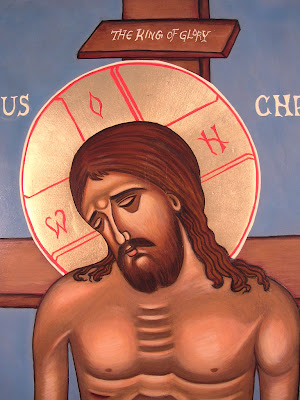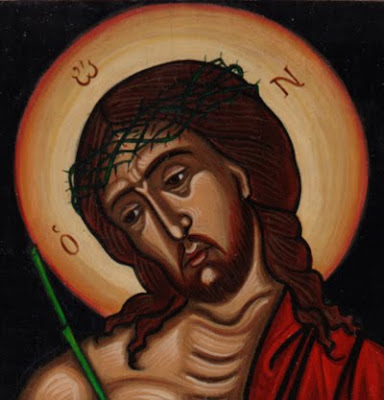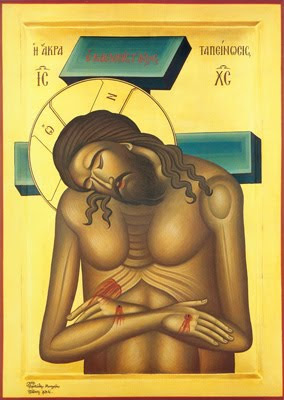>[Scroll down to read about the Letters A-G in “A Sinner’s Lenten Alphabet”]
Hesychia and
Hospitality
In my post about the Letter “E” I wrote about the Lenten Prayer of Saint Ephraim of Syria. One of the things we ask God to give us in that prayer is the spirit of humility. In my post on the Letter “F” I wrote that “humility attracts the grace of God.” I first read this statement several years ago in some of the writings of Saint Dorotheos of Gaza, and I find myself coming back to it over and over again.
But why am I grouping “humility” with “hesychia” and “hospitality”? I’m almost  finished with a new book by Stephen Lloyd-Moffett called Beauty for Ashes: The Spiritual Transformation of a Modern Greek Community. (Watch for a book review soon.) In the process of building a new monastic community in Preveza, Greece, the Bishop was careful to teach the monks about the “seven parts of monastic life.” One of those was “hesychia,” or inner watchfulness and prayer. Having spent some time at several Orthodox monasteries, I can understand a little about what Lloyd-Moffett describes about the monastics’ struggle to maintain this inner watchfulness in the midst of their other duties:
finished with a new book by Stephen Lloyd-Moffett called Beauty for Ashes: The Spiritual Transformation of a Modern Greek Community. (Watch for a book review soon.) In the process of building a new monastic community in Preveza, Greece, the Bishop was careful to teach the monks about the “seven parts of monastic life.” One of those was “hesychia,” or inner watchfulness and prayer. Having spent some time at several Orthodox monasteries, I can understand a little about what Lloyd-Moffett describes about the monastics’ struggle to maintain this inner watchfulness in the midst of their other duties:
“The monastery attempted to balance the desire for hesychia and the desire to show hospitality and provide counsel for its spiritual children.”
One way the monks keep their spiritual goals in mind is that they “do not take themselves too seriously but they take the spiritual life very seriously.”
I like that.
I think this same struggle exists on a different level for those of living “in  the world,” trying to balance work, family, and our own spiritual disciplines. For me, “success” in my spiritual life—prayer, fasting, almsgiving, reading Scriptures, going to Church—is only authentic when humility is present. Due to my pride, that doesn’t happen very often, but I try to press on.
the world,” trying to balance work, family, and our own spiritual disciplines. For me, “success” in my spiritual life—prayer, fasting, almsgiving, reading Scriptures, going to Church—is only authentic when humility is present. Due to my pride, that doesn’t happen very often, but I try to press on.
Of course Christ is our extreme example of humility:
“Let nothing be done through selfish ambition or conceit, but in lowliness of mind let each esteem others better than himself…. Let this mind be in your which was also in Christ Jesus, who…. Humbled Himself and became obedient to the point of death, even the death of the cross.” (Philippians 2:3,4,5,8)
![]() One of my favorite icons of Christ is called “Extreme Humility.” Actually, there are two types of this icon that vary a bit in their details, and one is called “The Bridegroom” and the other “Extreme Humility.” The one I painted for our parish is sometimes used during the three services in Holy Week known as “Bridegroom Matins,” as shown here on the solea at St. John.
One of my favorite icons of Christ is called “Extreme Humility.” Actually, there are two types of this icon that vary a bit in their details, and one is called “The Bridegroom” and the other “Extreme Humility.” The one I painted for our parish is sometimes used during the three services in Holy Week known as “Bridegroom Matins,” as shown here on the solea at St. John.
I’ll close with a gallery of icons of Christ, the Bridegroom, and Extreme  Humility. Click here to listen to Father Apostolos Hill chanting an Orthodox Hymn from Holy Friday while you look at the icons.
Humility. Click here to listen to Father Apostolos Hill chanting an Orthodox Hymn from Holy Friday while you look at the icons.
Or, if you prefer, click here to listen to Norah Jones singing “Humble Me.” Either way, may these holy images open our hearts to see the love and humility which Christ our Lord has for us as we continue our Lenten journey.









